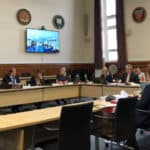OnTheWight always welcomes a Letter to the Editor to share with our readers – unsurprisingly they don’t always reflect the views of this publication. If you have something you’d like to share, get in touch and of course, your considered comments are welcome below.
This from Helen Curel, Chair of Governors, Oakfield Church of England Primary School. Ed
As chair of governors at one of the Isle of Wight schools earmarked for closure I am urging councillors to learn from the lessons of recent history.
A previous proposal to close schools to deal with surplus places in June 2023 was not approved. That’s because there wasn’t enough evidence to suggest why those three schools had been chosen, or if other options had been considered and dismissed.
The Scrutiny Committee recommended on 6th June 2023 that there should be more rigorous evidence on why those three schools were chosen. The main concerns were that too much had been based on the opinion of council officers, but we were assured that lessons would be learnt.
Inaccurate and incomplete data
Yet here we are in the same position again. Six schools have been named, but the criteria for selecting those six schools isn’t clear. The data supplied is inaccurate and is not complete. And various costings haven’t been itemised for councillors to make an informed decision.
If councillors are going to be consistent with what they promised 18 months ago, then they can’t support a decision to close any schools on Thursday, as the criteria and procedures that they have followed this time are the same.
Deeply flawed process
We’re mindful of the Members’ Code of Conduct for councillors, which suggests that councillors must behave in line with the seven Principles of Public Life. The schools named for closure have raised numerous concerns about inconsistencies and factual inaccuracies within the reports published so far.
We are genuinely concerned that the process is deeply flawed and has potentially misled consultees and councillors, whether intentional or not.
Misleading information
To give one example: the Isle of Wight Council’s brochure outlining reasons for closing Oakfield suggested that academic standards was one of the criteria used. But government guidance is clear that a local authority cannot close a school because of standards. Only the Department for Education (DfE) can do this, on the basis of its Ofsted report.
We’ve even checked with the DfE and they have no plans to recommend closure of our school for this reason. So officers are misleading councillors if they suggest that academic standards are a good reason for closing Oakfield.
Incorrect figures
One example of inaccurate data is that officers have given incorrect figures for the number of staff working at Oakfield. Clearly this will affect the cost of any potential redundancy payments to those staff. But of course they haven’t even provided a costing for such payments based on that incorrect figure anyway.
And the document makes a point of saying that pupils from primary and secondary schools have been consulted directly and widely, because this affects their future. In fact, no pupil from Oakfield C of E Primary has been asked for his or her views on the closure of their school.
Defer decision
So we urge Cabinet members not to take a decision on the closure of our schools on 12th December 2024, and instead to initiate an Island-wide engagement which includes the valuable contributions of school leaders to address properly, fairly and transparently the issue of surplus school places.
It is an Island-wide issue and should not be a burden just a handful of schools, and disproportionality Church of England schools and communities, have to bear.





